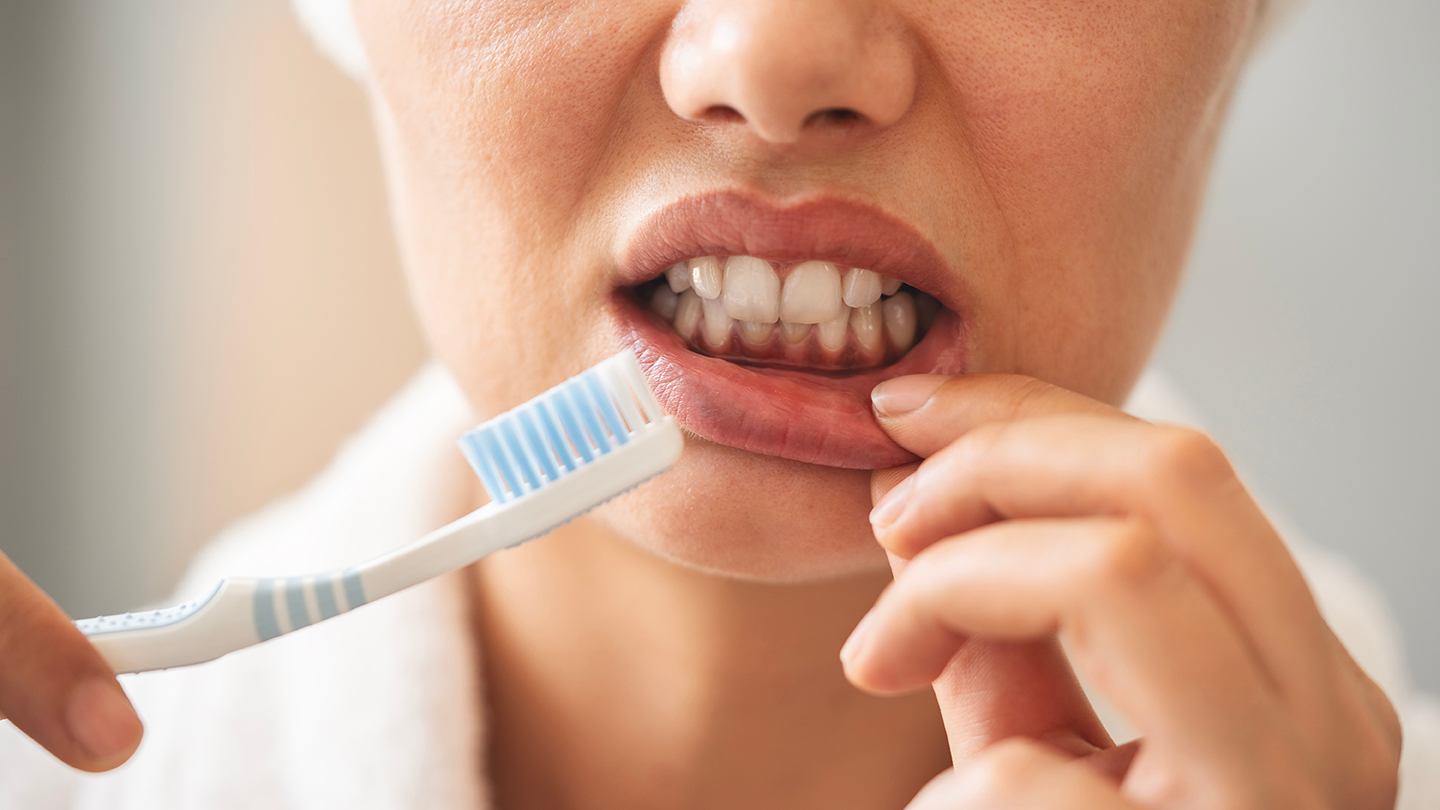Why your gums are inflamed and how to treat them
• Fluctuating hormones levels can affect your gum tissue
• Don’t ignore bleeding gums as it can be a sign of gingivitis
• Discover the risk factors and treatments for bleeding gums
During perimenopause, many of us know to expect erratic menstrual bleeding as a potential symptom. But gum bleeding? Although it’s not a well-known symptom, it isn’t unusual to experience this.
For women who do experience bleeding gums, it’s natural to worry about your oral hygiene and health – but it doesn’t necessarily mean you’re doing anything wrong.
Why do gums bleed?
Usually, the main cause of bleeding gums is a build-up of plaque. This can irritate your gums and, if left for too long, hardens to tartar, which will continue to irritate. Irritation can cause your gums to bleed, and can lead to gum disease.
A vitamin C deficiency has also been linked to bleeding gums [1], plus certain medications – including ibuprofen, aspirin, warfarin, blood pressure medications, diuretics and antihistamines – can cause bleeding gums.
Also, medical conditions such as haemophilia and Von Willebrand’s disease make you more prone to bleeding while brushing.
RELATED: Oral health, perimenopause and menopause
How do perimenopause and menopause affect gums?
Your hormones, particularly progesterone, estradiol and testosterone, are essential for healthy gums but fluctuations and low levels can affect your gum tissue. Changes in progesterone can increase your susceptibility to bacterial plaque, plus when estradiol drops, the blood flow in your gum tissue can be affected and the surrounding tissue can thin, so you can bleed more easily. ‘It also decreases your body’s ability to fight off infections, and affects the ability to maintain a healthy balance of good and bad bacteria in your mouth,’ says dentist Dr Shabnam Zai.
Estradiol-receptor cells can be found in your mouth, with many located in the membrane that coats your mouth and saliva glands. When they receive a lower level of estradiol, they produce less saliva. ‘This not only causes your mouth to become dry, but the reduction in saliva means less food and bacteria is flushed away, so it can be left to irritate the gums. Saliva is also a buffer that helps neutralise the acid in the mouth after eating,’ says Dr Shabnam.
A rare condition is menopausal gingivostomatitis. This is where gums appear dry, pale and shiny with redness and occasionally bleed easily [2].
RELATED: Dry mouth, hormones, perimenopause and menopause
How do I treat my bleeding gums?
It’s important to treat bleeding gums as it can be a sign of gingivitis, an early stage of periodontal disease. It is caused by bacteria, so the first step is to keep up good oral hygiene so that you tackle bacterial plaque. Continue brushing twice a day, flossing daily and visiting your dentist twice a year.
The main risk factors for gum disease are smoking, diabetes, stress and a genetic link. Whilst you cannot help if you are genetically predisposed, if you smoke, consider getting support to quit.
If your diabetes is not well controlled, it can cause increased bone loss and prevent healing of the gums. But keeping it under control can significantly reduce symptoms, as can controlling your stress levels.
Ensure you don’t eat too many sugary foods. Acidic foods can irritate bleeding gums but you need to eat enough vitamin-C rich foods – these have been found to help manage bleeding gums and slow any potential development of gum disease.
RELATED: Healthy eating for perimenopause and menopause
‘Chlorhexidine gluconate is the gold standard for mouthwashes to help during acute episodes of bleeding,’ says Dr Shabnam. ‘It is not a substitution for a dental check-up, diagnosis and hygiene but when used, it can significantly reduce the bacteria load in your mouth. It should not be used at the same time as brushing with fluoride toothpaste (leave at least a 30-minute gap) and overuse can lead to brown extrinsic staining of the teeth. This can be avoided by not using for more than five days. I always recommend a blood test to ensure you do not have any deficiencies, and drink plenty of water between meals.’
RELATED: Do I need supplements during menopause?
HRT and testosterone is usually the first line treatment for perimenopause and menopause symptoms. A study of nearly 500 women between the ages of 50 and 87 found that rates of gum disease were significantly lower in those taking HRT [3].
Dentist Dr Shabnam Zai is clinical director at West House Dental. Follow her on Instagram @drshabnamzai














